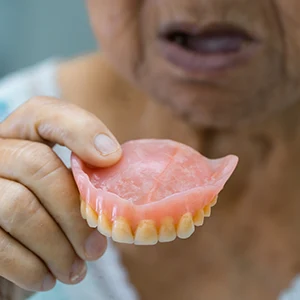Request Appointment
Kissimmee

New Patients Only: (407) 635-1196

All Other Callers: (407) 932-2273
Saturday By Appointment
Schedule Now

Call Us
Call Us Now

Dentures provide a reliable solution for replacing missing teeth and restoring function to your smile. However, one of the most common concerns among denture wearers is maintaining their stability. Loose dentures can cause discomfort and frustration, making daily tasks like eating and speaking challenging. Thankfully, there are several top denture stabilization methods available today to ensure your dentures stay securely in place.
In this article, we will compare adhesive types, soft relining, mini implants, and overdentures as top denture stabilization methods to help you determine the best option for your denture needs.
Top denture stabilization methods often include denture adhesives, which are widely used for stabilizing dentures. They provide a temporary yet effective way to keep dentures in place throughout the day. Available in paste, powder, and strip forms, these adhesives are easy to use and accessible, making them a popular choice for many denture wearers.

Soft relining is a process in which a soft, rubbery material is applied to the underside of the denture, adapting to the contours of your gums. This material creates a better fit, reducing discomfort from loose dentures and providing additional cushioning.
As one of the top denture stabilization methods, mini implants are smaller than traditional implants and can be placed in areas with less bone density, making them an excellent choice for people who may not be candidates for conventional dental implants.
Mini implants are small titanium posts surgically placed in the jawbone. After osseointegration, the denture is secured to the implant with a specialized attachment, providing a more stable foundation than adhesives or soft relining.
Overdentures are dentures that are supported by either dental implants or natural teeth. They offer superior stability and comfort compared to traditional dentures, as they are anchored securely, either on implants or remaining teeth. Overdentures represent one of the top denture stabilization methods for those who want the best possible fit and function.
Implants are placed in the jawbone, securing dentures with specialized attachments. In some cases, overdentures can be supported by natural teeth, offering a stable and functional solution for those seeking the best fit for their dentures.
Here are some points to consider when making your decision:
If comfort is your top priority, overdentures or mini implants may be your best options. They provide a more secure and natural feel, minimizing discomfort caused by loose dentures. For those looking for an affordable and noninvasive solution, adhesives and soft relining can provide temporary comfort improvements.
If you're seeking a long-term fix, mini implants and overdentures are the most permanent options. Adhesive types and soft relining require more frequent maintenance and reapplication.
Adhesive types and soft relining are more affordable options for those on a budget, offering quick fixes that are less expensive than surgical procedures. On the other hand, mini implants and overdentures come with higher upfront costs but offer greater stability and durability.
The best way to determine which denture stabilization method is right for you is to consult with a skilled dentist. At Parkway Dental Care, we offer personalized advice based on your unique needs and can help guide you through the decision-making process.
There are several top denture stabilization methods to choose from, including adhesive types, soft relining, mini implants, and overdentures. The best option depends on factors like comfort, budget, and long-term needs.
At Parkway Dental Care in Kissimmee FL, our skilled team is here to help you find the best solution for your dentures. Whether you need a temporary fix or a permanent solution, Call (407) 635-1196 or contact us today to schedule a consultation.
The most effective denture stabilization method depends on your specific needs. Overdentures and mini implants provide the most stable, long-lasting results, offering secure, natural-feeling support for your dentures. Adhesive types and soft relining are effective short-term solutions but may not offer the same level of stability for long-term use.
Mini implants can last for many years with proper care. Unlike adhesive types, which require frequent reapplication, mini implants are designed to be a long-term solution to denture stabilization, offering a stable foundation for your dentures.
Yes, denture adhesives can be used daily. However, it's important to clean your dentures properly each night and apply the adhesive according to the manufacturer’s instructions to avoid irritation or discomfort.
Soft relining typically lasts 1 to 2 years, but this depends on changes in your gums and the fit of your dentures. Regular visits to your dentist are essential to monitor the condition of your dentures and ensure they remain comfortable and secure.
Overdentures offer superior stability and comfort compared to traditional dentures. They are anchored securely using implants or natural teeth, providing a better fit and enhanced chewing function. While they are more expensive, overdentures are a long-term solution for those looking for the best possible fit and function.